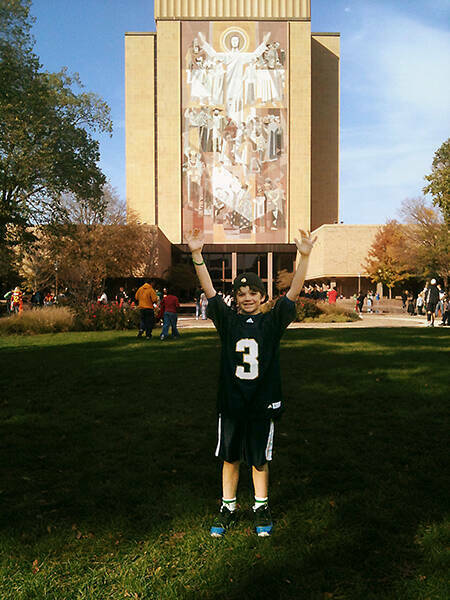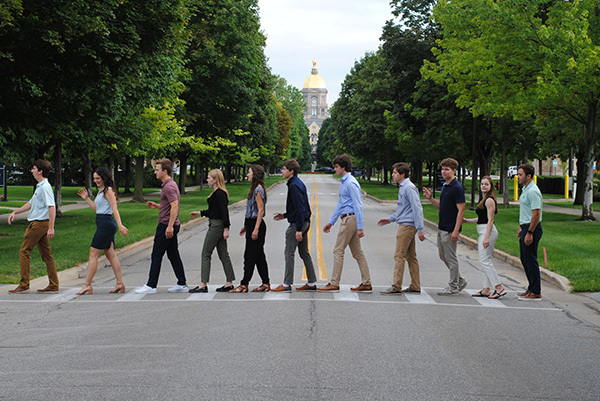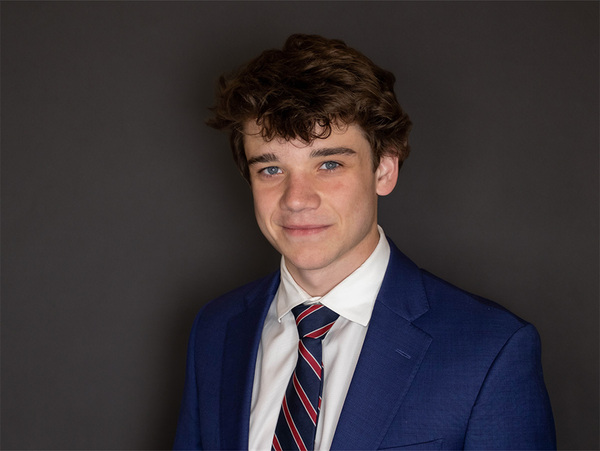Understanding the how and why: Layton Hall ’24 applies economic research to domestic and international development questions

When Layton Hall stepped onto the University of Notre Dame campus as a freshman, his childhood memories came flooding back.
Originally from Colorado, Hall's first and only time visiting campus previously was when he was 11 and with his family to attend a Notre Dame-USC football game.
Seven years later, on campus as a student, Hall was in “utter awe.”
“It was kind of a flashback to the last 18 years of my life at that point, of just all of the times rooting for Notre Dame with my family,” Hall said. “I was looking forward to making that experience my own.”
Now, as a graduating senior majoring in political science and economics, Hall says he’s accomplished just that.
During his four years on campus, Hall engaged in South Bend community housing advocacy, worked with low-income housing nonprofits across the country, and expanded into international development economics research.
“Notre Dame pushes students into a lot of really cool opportunities that maybe people wouldn't want to say yes to at first,” he said. “But if you stick with something, you're ultimately going to get yourself involved in something cool. Finding those opportunities and saying yes to them is a really important thing to make the most of your time.”
Empathy through economics
Notre Dame’s call to not just learn for knowledge's sake, but to be a force for good in the world, struck a chord with Hall.
His mother worked in child protective services and taught her children to empathize with others and see how they can help. Hall believed his trajectory in helping others was through politics.
In his early coursework, Hall was fascinated to learn the difference between the study of political science and politics itself and said it was a great way to understand how the world works.
His area of interest was also broadened after taking a microeconomics class, in which he enjoyed learning the logistical side of why the world works and why people make the decisions they do.
“It opened up my eyes to what economics research can be,” Hall said. “I had this bias — and I think a lot of people do, too — in believing economics is just the study of money and stocks, and that's not what my experience has been at all.”

Through the Student Policy Network, Hall began to focus on housing advocacy and was connected to the community organization South Bend Tenant Association (SBTA). His involvement there catapulted him into fair housing research, where he was able to combine his personal interest in helping others, and his academic interest in understanding how and why certain societal systems are in place.
Working with SBTA opened Hall’s eyes to how the eviction process puts tenants — especially those from lower-income communities — at a disadvantage in many different ways.
“I saw that in the real world,” he said. “And then the more research I did into it, I realized how prevalent of an issue housing is across America and not just in South Bend.”
Hall worked with Wilson Sheehan Lab for Economic Opportunities (LEO) as a research assistant for two years, meeting with housing nonprofits across the country to see how LEO could apply economic models like a randomized control trial (RCT) to learn more about what’s working and what could improve.
“It was a really interesting mesh of academic research and interacting with people who were doing boots-on-the-ground work and making a difference,” Hall said. “It was really cool to be exposed to their passion and how they've dedicated their entire livelihood to one issue.”
He further applied his interest in fair housing to his senior thesis, which focused on racial disparities in the eviction process. During his research, Hall said he learned a lot about the economics of discrimination within bias systems that are in place across many societal situations.
“My results do not establish causal evidence of bias,” he wrote. “They highlight the complexity of the issue and the need for further research into the judicial role of the eviction process.”
Broadening into a worldview
Hall also began applying what he’s learned domestically to international development research.

He recently took an Imperial Methods in Development course and his interest in development economics was piqued as they discussed math and policies. Hall then worked as a research assistant through the Building Inclusive Growth (BIG) Lab, where he helped with coding and background research.
Now, Hall is working with a faculty member on publishing a paper tentatively titled “Fraternity or Fracture? National Identity, Religious Minorities, and Communal Violence in India” that examines the fragility of national identity within India, as it relates to religion and cricket.
"I learned a lot about the whole world of development economics and the many complicated issues that come with it,” Hall said. “My interest in it grew, and that was something I didn't quite expect.”
After graduation, Hall will start a full-time job at Cornerstone Research, an economic consulting firm that will provide him the chance to offer economic analysis on a day-to-day basis. While he has always considered going to law school, the work Hall will do will also expose him to lawyers and experts in economics.
In his time at Notre Dame, Hall has learned not to pigeonhole himself into one specific interest or experience.
“I'm just really grateful for what Notre Dame had to offer,” he said. “What the University says about using your knowledge for good, to impact those around you, holds true in a lot of ways. I think getting to be involved in those opportunities in so many different ways has shaped me, my worldview, and my dedication to others.”
Originally published by at al.nd.edu on May 16, 2024.
Latest Research
- University of Notre Dame and IBM Research build tools for AI governanceMain Building (Photo by Matt Cashore/University of Notre Dame) …
- Smarter tools for policymakers: Notre Dame researchers target urban carbon emissions, building by buildingCarbon emissions continue to increase at record levels, fueling climate instability and worsening air quality conditions for billions in cities worldwide. Yet despite global commitments to carbon neutrality, urban policymakers still struggle to implement effective mitigation strategies at the city scale. Now, researchers at Notre Dame’s School of Architecture, the College of Engineering and the Lucy Family Institute for Data & Society are working to reduce carbon emissions through advanced simulations and a novel artificial intelligence-driven tool, EcoSphere.
- Seven engineering faculty named collegiate professorsSeven faculty members in the Notre Dame College of Engineering have been named collegiate professors—a prestigious title awarded by the university and college in recognition of excellence in research, teaching and service. The designation may be conferred on faculty at the assistant, associate or…
- ‘A special challenge’: German studies scholar wins National Humanities Center fellowship for research on medieval womenFor CJ Jones, the joy of research is not the answers but the journey. And the next step on that journey is a fellowship with the National Humanities Center. …
- Notre Dame Lead Innovation Team partners with local WIC program to identify, prevent lead poisoning in childrenB.A.B.E. store “shoppers” now have something new to help their families: free lead screening kits offered by the University of Notre Dame’s Lead Innovation Team.
- Notre Dame Welcomes Ninth Cohort of Warrior-Scholars for Transformative Academic JourneyNOTRE DAME, IN – The University of Notre Dame recently concluded its ninth successful Warrior-Scholar Project (WSP) boot camp, hosting 34 dedicated Warrior-Scholars from June 21st to 28th. This intensive, week-long academic residency provided transitioning service members and veterans…













